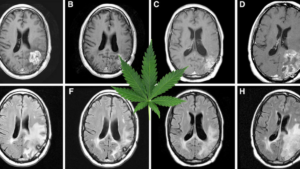With the recent trend of medical marijuana legalization going on across the country, there has been an increase in the awareness of cannabinoids other than the infamous THC (Tetrahydrocannabinol). While many people now acknowledge that marijuana has medicinal benefits, they still do not fully understand why or how it helps with certain ailments. While THC may get a lot of the publicity for its euphoric and pain relieving effects, CBD (Cannabidiol) is just starting to be recognized for its amazing medicinal properties as well. In fact, many of the medicinal properties of cannabis are directly related to CBD and how it interacts with its fellow cannabinoid THC.
First, it is important to understand what makes THC and CBD so different from one another. The most glaring of these differences is that THC is psychoactive while CBD is not psychoactive. More simply, THC will give you the euphoric “high” feeling that is normally associated with marijuana. In contrast, not only will CBD not cause a “high” feeling, it will actually help dampen the effects of any psychoactivity induced by THC. While this may not be desirable for the average recreational user, there are many other properties of CBD that are purely medicinal such as; anti-inflammation, anti-anxiety and anti-fungal. Add to these the fact that if combined with one another, CBD and THC make a powerful source of overall healing due to their primary properties of pain relief and anti-inflammation. Since we have now established that THC is the psychoactive pain relieving cannabinoid and CBD is the non-psychoactive multi-use cannabinoid, we can better understand why one has the ability to get us “high” and the other does not.
It all begins with our endocannabinoid system or ECS. While the endocannabinoid system is very complex and in depth, it is worth looking into as it relates to our overall health far more than the average person realizes. However, for the purposes of this article it is really only necessary to understand the more simple aspects of our ECS. For one, the ECS is a cell-signaling system located throughout our bodies and has two main receptors, CB1 and CB2. These receptors play a key role in memory, mood, brain reward systems, metabolic processes (such as glucose metabolism) and energy balance. Essentially, they play a large part in the normal functioning of the brain, spinal cord and nervous system. Since CB1 receptors are most prevalent in the brain and hold the key to psychoactivity, they will be our focus here.
What makes CB1 receptors so important is the way they interact with THC and CBD. Simply put, THC attaches to and activates our CB1 receptors while CBD attaches, but does not activate the same receptors. The easiest way to visualize this is a lock and key. Imagine THC and CBD are keys and the CB1 receptor is a lock to a reward. If THC is introduced the lock is turned and the reward is earned. However, when CBD is introduced, the key fits in the lock but does not turn. This is crucial because, even though the CBD key does not turn to open the lock, it still takes up the space. Now, even with the right key (THC), it would be blocked from accessing the lock by the CBD key that has taken up the space. This process is what makes one cannabinoid psychoactive and the other non-psychoactive.
So in the end, what makes CBD non-psychoactive is the fact that it fits into our CB1 receptor without activating it at the same time. Taking up this space makes sure that any THC that comes along has no space to activate both the receptor and our “reward” system, which results in the euphoric “high” that has long been associated with cannabis. This is just the beginning–better understanding of the ECS and cannabinoids in general can help with figuring out how to properly treat a condition or ailment with the desired effect, whether that effect be psychoactive or non-psychoactive.
SOURCES
(1) Endocannabinoid System Roles
(2) CBD vs. THC: Why Is CBD Not Psychoactive?
(3) Is CBD Really Non-Psychoactive?
DISCLAIMER: The information on this site is not intended or implied to be a substitute for professional medical advice, diagnosis or treatment. All content, including text, graphics, images and information, contained on or available through this web site is for general information purposes only. Always consult a doctor before making any health changes, especially any changes related to a specific diagnosis or condition.




